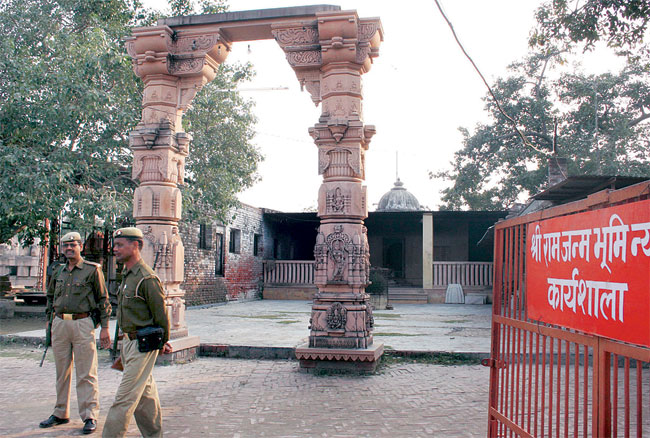Ayodhya : “Please treat this as a land issue.” :CJI
 NEW DELHI : The Supreme Court conveyed its clinical approach to the 70-year-old Ramjanmabhoomi-Babri Masjid title dispute, exhorting the parties on either side of the fence to treat it merely as a “land issue.”
NEW DELHI : The Supreme Court conveyed its clinical approach to the 70-year-old Ramjanmabhoomi-Babri Masjid title dispute, exhorting the parties on either side of the fence to treat it merely as a “land issue.”
Indicating it would not be swayed by the history of religious conflict and violence associated with the Ayodhya site, Chief Justice of India (CJI) Dipak Misra addressed a tense and crowded courtroom, saying “please treat this as a land issue.”The Supreme Court has adjourned the politically-sensitive title dispute case to March 14 since documentation and translations are yet to be complete.
The bench, comprising CJI Dipak Misra, Justice Ashok Bhushan and Justice S. Abdul Nazeer, however, made it clear that it would deal with the case as a “pure land dispute”. The cross petitions had challenged the 2010 Allahabad High Court verdict that had divided the disputed site between the Nirmohi Akhara, Lord Ram deity and the Sunni Waqf Board. Meanwhile, the Ayodhya Sadbhavna Samnvyay Maha Samiti has made a proposal to the All India Muslim Personal Law Board (AIMPLB) on the dispute.
The Hindu parties and sects involved in the dispute believe Lord Ram was born on this land. Kar sevaks razed the 15th century Babri Masjid on December 6, 1992. In September 2010, a three-judge Lucknow Bench of the Allahabad High Court attempted to bring quietus by pronouncing a three-way partition of the disputed site. But this judgment had only led to appeals and cross appeals filed by parties in the Supreme Court.
The court warded off third-party intervenors, who said they wanted in as the Ayodhya appeals dealt with an issue that impacted the nation. But a Bench, comprising the CJI and Justices Ashok Bhushan and S. Abdul Nazeer, firmly told them that these were appeals and cross-appeals filed in land suits, and parties concerned were quite capable of arguing them without any third party interventions.
When senior advocate C.U. Singh, representing some “prominent names,” reminded the court that these Ayodhya appeals had come to the limelight because of an intervenor, BJP MP Subramanian Swamy, Chief Justice Misra brushed it aside, saying “how do I know? The case was posted to this Bench by my predecessor [then Chief Justice J.S. Khehar].”
The court then recorded that over 500 exhibits, which include the Bhagavad Gita, Ramayana and documents written in various languages like Sanskrit and Pali, have been filed. The depositions of 87 witnesses have also been filed along with the Archaeological Survey of India’s reports. The court indicated that it may prioritise the Ayodhya appeals once the final hearings commence. The court posted the Ayodhya case for hearing on March 14. (with Agency Inputs ).

